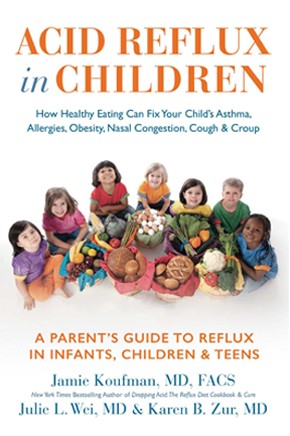
Dental Problems? Explore Reflux (It’s Not Just Heartburn & Indigestion)
At-A-Glance
- Heartburn and indigestion are familiar symptoms of acid reflux. However, they are experienced by fewer than 20% of people with acid reflux. Breathing issues and cough are the most common symptoms.
- Acid reflux can cause cavities, gum and dental disease.
- Treatment of reflux can effectively stop disease progression, but treatment by dentists or oral surgeon is usually still needed.
A 56-year-old accountant was referred to me with rapidly progressive dental and gum disease by an oral surgeon who suspected that the man had reflux into his mouth causing the problem. I examined the patient and performed reflux testing. Indeed, his reflux was severe.
I placed the patient on an intense anti-reflux program and all of his dental and gum disease stabilized. He did end up having some gum repair surgery, but I followed them for two years with no recurrence of the problem.
Gum disease (gingivitis) is usually attributed to dental hygiene, inflammation of the gums, plaque and tartar. In general, this process is relatively slow, often taking 10+ years to become obvious. But progressive dental and gum disease in an adult, usually over a one- to two-year period, is likely to be related to acid reflux (i.e. LPR, respiratory reflux and particularly silent nighttime reflux).
Many of these patients will tell you that they can taste a bitter/ sour taste in the morning – that is the most obvious sign that silent nighttime reflux can be the cause. By silent, we mean reflux that doesn’t present as indigestion or heartburn. Coughing, breathing and speaking are the most common signs of silent reflux.
By the way, this connection between dental issues and reflux is recognized in the dental literature, but it is not easy for dentists to make a positive diagnosis other than recognition of related reflux symptoms.
What Lifestyle Choices Cause Acid Reflux / Dental Issues?
The greatest risk factors for silent nighttime reflux that causes dental disease are:
- Eating too late
- Eating foods that cause reflux (high-fat foods, fried foods, chocolate, etc.)
- Having the evening meal be the largest meal of the day
- Going to bed with a full stomach
- Drinking too much alcohol
- Mint relaxes the lower valve, so switching to a cinnamon mouthwash helps some
First, See If You Likely Have Reflux
The Koufman Reflux Symptom Index (RSI) is a proven tool to determine if you likely have acid reflux. Note that heartburn and indigestion are just one symptom in the index (which only 20% of refluxers experience).

If you have an RSI score of 15 or greater, you have a 90% chance of having reflux, even if you have never had heartburn or indigestion. This is called silent reflux, and it’s very common.
Please understand that it’s important to take steps if you have reflux to manage it through lifestyle changes (explained later). If you let reflux run rampant, you’re setting yourself up for sleep apnea, COPD, chronic respiratory conditions, and a far higher risk of esophageal cancer.
Where to Get More Information
My best-selling book Dropping Acid is a comprehensive place to start. If you’d like an initial primer on reflux, this article is also wonderful.
If you’ve read at least one of my books and you’re following my guidance and you still need help, you can book a consultation with me.
P.S. – Why Doesn’t My Doctor Know About This?
I get asked this all the time: “Why doesn’t my doctor know about this?!”
My primary research on acid reflux and chronic cough has been available for decades. Dropping Acid has been a best-seller for a decade. And I was on TV and quoted in mainstream media for many years. But the medical community remains virtually unaware that LPR (laryngopharyngeal reflux), today often called silent reflux or respiratory reflux (all terms I coined), is a major cause of respiratory issues and chronic cough. In addition, neurogenic cough seems almost never properly diagnosed.
Thousands of my patients have been on a merry-go-round of specialists… a GI doctor, an ENT, an allergist, an asthma specialist. They’ve had tens of thousands of dollars of tests, prescriptions for medications that never could have helped them, and their respiratory issues never improved.
The problem in the U.S. is over-specialization. Most Americans mistakenly believe that they must see specialists for almost every medical problem. What people don’t know is that specialists determine what services insurance will pay the most for, and they can choose to deliver those expensive services… even for patients who don’t need them! The idea of dividing the body up into small, non-overlapping, anatomic areas makes no sense. The respiratory and digestive systems are intimately connected, and specialists do not seem to know that.
Imagine building a house by allowing each workman to do his own thing. The plumber would put a sink in every room. The electrician would install chandeliers on every ceiling. The carpenter would panel every room in luxurious wood. That’s how America’s medical specialist system works.
The evolution of my personal medical practice as an expert in acid reflux that affects the throat and airway (LPR, silent reflux, respiratory reflux – all terms that I coined) helped me see that silent respiratory reflux was ubiquitous. That means it’s all over the place, and it’s likely in almost half of Americans. REFLUX is the single most common cause of “allergies,” “asthma,” “sinus disease,” true sleep apnea, and chronic cough.
Please read up and advocate for yourself, finding solutions that may be elusive through traditional care channels.










